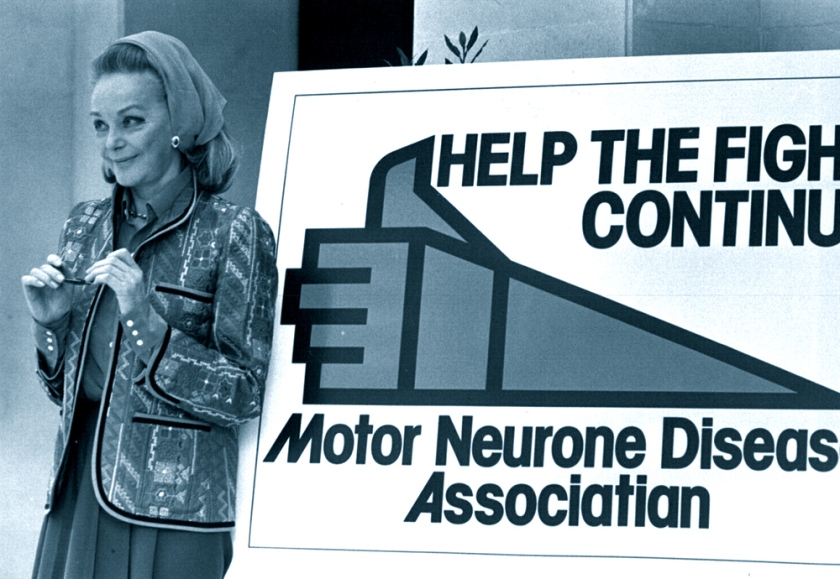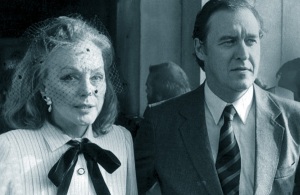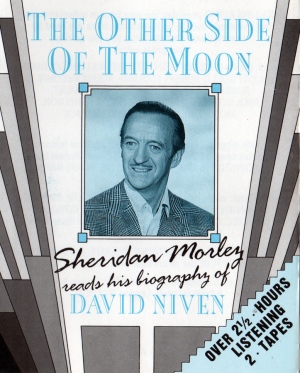
Hjördis stayed away from Chateau-d’Œx in the year following David’s death. Graham Lord wrote that she “drank herself into a stupor every day, which caused numerous rows with Fiona” (her adopted daughter).
Hjördis’ friend Fiona Owen simply says: “The fact that her life fell apart when David died was hardly surprising.”
The chalet’s house-keeper Mme Antoinette Andry spoke to the Daily Mail in late 1984: “When the master was alive the house was alive, the house was like a fun palace. He died and it became a gloomy hole. [Strong description or what.] Madame was so desolee.” She added that the chalet was closed up after David’s death, with the grass left uncut and the mailbox overflowing.
Unsurprisingly there is no mention of Hjördis attending two Chateau-d’Œx events held in David’s honour during the the first seven months of 1984: a special paratroop jump to open International Hot Air Balloon Week on 22nd January, and a memorial concert at the Anglican church on the first anniversary of his death.
“It’s fair to say there was a period of time when she was terribly depressed and she was a recluse,” David Jr revealed.
Many of David’s friends took an unsympathetic view. “I was in London when David died but I couldn’t bear to see Hjördis and pretend I had any affection for her, ” Robert Wagner wrote in ‘Pieces of My Heart’. “I waited until after the funeral and then went to the cemetery and left flowers at David’s grave. After David died, most of his friends simply shut Hjördis out.”
Rumours of Rainier

At David’s funeral, Hjördis clung onto Prince Rainier’s arm. Barely a month later strange rumours appeared linking them in another way.
“My friend the barman in Gstaad tells me that David Niven’s beautiful widow Hjördis is being consoled by that loneliest of widowers, Prince Rainier. Could consolation turn to something else I wonder?” wondered Chris Hutchins in his completely un-confidential Daily Mirror “confidential” column. To answer his question: yes it could. It could turn into ten years of rumours that soon spread across the Atlantic.
“Aren’t Prince Rainier and Hjördis Niven seeing each other in quiet, out-of-the-way restaurants? Aren’t they planning a quiet wedding in Switzerland?” Ms Donna C of Las Vegas breathlessly [nosily more like] asked an American newspaper in January 1984.
A mini-flood of similar questions was answered with: “Papa Rainier may be heading back to the altar soon. Word is, he and David Niven’s widow, Hjördis, are very, very close.” Word is, the rumours seemed very, very spurious but still took hold.
Variations of the story popped up in June 1984. It then took something of a breather, for ten years, before really kicking off again. (Pardon me for popping forward a decade in the narrative, promise I’ll get back soon…)
The second time around, it was sourced in New York. “Yesterday, royal circles in Monaco were abuzz with speculation after a New York newspaper reported that Prince Rainier had proposed,” UK tabloid reporter Ivor Key [made-up name?] wrote on 1st January 1994.
“The Prince has often invited Hjördis to his Monaco palace or stayed at her luxurious chalet [Uh-huh. In which decade?]. A confidant of Rainier broke the news of the proposal while dining at Shin’s Oriental restaurant in Manhattan!” [So, now we know where the confidant was dining.]
The newly resurgent rumour was stamped on quickly and emphatically. “Prince Rainier of Monaco has no plans to marry the widow of David Niven,” Stars & Stripes’ no-nonsense mini-article stated on 6th January 1994.
“‘One wonders how such a completely baseless rumour managed to spread’ said Jacqueline Berti, director of the principality’s press centre.”
Ms Berti also forwarded a comment from Prince Rainier that he hadn’t seen Hjördis since David’s funeral in 1983. That seems like the saddest part of the whole non-episode.
Fiona Owen has pointed out that the original Grace & Rainier / David & Hjördis friendship was primarily based on Grace & David’s friendship. Fiona remembers that Hjördis considered the gossip pairing her with Rainier “a ludicrous joke.”
In March 1994, Hjördis was asked whether she would consider getting married again. Her answer: “No, never!”
The David Niven legacy
Graham Lord’s ‘Niv’ biography noted that over a year after David’s death, Hjördis “finally admitted that she needed help, and checked into a French clinic for alcoholics.” It seems she was encouraged by the doctor friend she had met at the Wellington hospital back in March 1983.
Her absence from a BBC ‘Hollywood Greats’ television documentary about David, made in 1984 and broadcast on 8th January 1985, was noted by TV critic Maureen Paton, who sharpened her pencil and got dissecting:
“The Great Raconteur was an elusive tale to the last. Justice wasn’t even done to his finest qualities. They were only vaguely sketched by famous friends like Peter Ustinov, who talked sweepingly of the playboy’s profundity and intelligence without going into specifics. It was as if everyone were still too spellbound by the force of the man’s personality to see him clearly.”
“Niven’s second wife Hjördis adopted two girls and from then on cut her stepsons dead. Niven was too busy filming for the boys to take their grievances to him. And neither Hjördis nor the daughters would contribute to the programme so that chapter remains a mystery. As was the man himself.”
The Other Side Of The Moon

Hjördis’ time in rehab seems to have been a complete success. “She has cleaned herself up in a French clinic and returned to full health,” Baz Bamigboye reported in the Daily Mail on 6th November 1984.
David Jr politely corroborated: “I spoke to her a few days ago and she was as sober as I am now. The truth is that she did a lot of drinking but that hasn’t happened for some time. She’s out and about now and happy. She’s in sensational shape.”
Life began to resume at the chalet in Switzerland. “The windows have been opened and cleaned and the grass has been cut,” Mme Andry announced. “I too live alone, maybe we can both start life again. I can be a comfort to her.” (The housekeeper’s husband died three days before David.) Mme Andry was as good as her word. Her family was a consistent help to Hjördis for many more years.
“I heard that Hjördis quit drinking and filled up her time by socialising,” Robert Wagner wrote in his autobiography, rounding off his last mention of her.
“She took up with a gay couple,” according to Graham Lord, “helped with an AIDS foundation, and was coaxed out for dinners and parties by Andrew Vicari.”
Hjördis’ gentle return to public life came during a wave of David Niven books and tributes. For a time she was willing to participate. Most importantly, she agreed to be interviewed by Sheridan Morley for the first David Niven biography, ‘The Other Side Of The Moon’, which sought to look beyond the force of the man’s personality.
Both as a writer and as the son of actor Robert Morley, Sheridan had known David on and off for many years. When the biography was suggested to him in 1983, his first instinct was to run the idea past David Jr: “He wrote back a remarkably enthusiastic go-ahead which included an agreement to talk to me about his father, without any request to see the manuscript before publication.”
In the book’s acknowledgements, dated March 1985, Morley continued: “I have to thank the three other members of David’s family who were all equally generous in their agreement to talk to me, again without any demand for control or even sight of the manuscript: David’s widow Hjördis, his sister Grizel, and his younger son James.” Hjördis for one got more than she bargained for.
Compared to Graham Lord’s Hjördis hatchet job ‘Niv’, published six years after her death, ‘The Other Side Of The Moon’ is quite gentle, for the most part. Only the introductory chapter – ‘1985’ – lets slip and must have been quite a revelation after ‘The Moon’s A Balloon’ and years of cheery interviews.
Sheridan Morley’s introduction describes “an often deeply unhappy second marriage,” which is downright stark compared to the rest of the book, as is a statement summing up the conflicts within David’s personality: “Niven was a devoted father and husband who went through the female population of Hollywood like a mechanical digger.”
Morley then recounts a story which (unsurprisingly) was not included in David’s autobiographies: about an older David confusing an offer involving the term ‘blow’ (marijuana) with the more familiar ‘blow(job)’ at a party, which leads to him enthusiastically dropping his trousers in front of a screaming actress. And to round it off: “Nor did David ever talk or write about his long and cheering affair during the 1970s when he was living, whenever in London, with the wife of a distinguished investigative journalist on The Times.” It’s hardly surprising that David didn’t include those stories in his published anecdotes.
‘The Other Side of the Moon’ was published in October 1985. Hjördis’ reaction was revealed by Larry Fields of the Philadelphia News:
“David Niven’s widow Hjördis is furious at author Sheridan Morley for tattling in his ‘The Other Side of the Moon’ biography that Niven towards the end of his life had a secret mistress in London as well as a secret love in Frump City.” [Frump City = New York? That doesn’t sound like a compliment.] For an encore, Fields tacked on the old Hjördis / Rainier rumour. Oh, give it a break!
In December 1985, Dick Kleiner of NEA quoted Sheridan Morley as saying that all he had heard from Hjördis and Jamie after the book’s publication was “a thunderous silence”.
“He did receive what he calls ‘an icily polite’ note, wishing him well, from David Junior,” Kleiner wrote, “and also ‘a nice letter’ from David’s sister Grizel, saying ‘David is in there.'” Well, it says something that Grizel liked the book.
Next page: I want to be free, 1985-1997
Dear Web Author, I just wanted to say this is a thoughtful and long overdue reassessment of Hjordis. I have read a lot of the biographies you quote (Lord, Morley etc) as well as more general books on Niven, such as the one by Tom Hutchinson.
Even at the time I read them, I felt Hjordis was being treated unfairly, something you have done a great deal to correct. The views expressed in those books were very partisan, and firmly in the David camp – which is not to suggest they were any less truly felt by those contributors. Nevertheless, yours is a much more balanced piece, and I think much fairer than other Niven biographies have been.
I am not saying She always behaved impeccably (none of us can claim that) or that She didn’t have faults, but your piece does take the trouble to look for the reasons behind her actions…and there are always reasons why we behave badly at times, some valid, justified or, at least, understandable; some not so.
You also, correctly I think, allude to the unfairness of approach when writers (and let’s be honest – most of Niven’s biographers were men of a similar age, class and type) describe extra marital affairs. Harmless flings from an old rascal (when it’s a male) or sluttish, disloyal and offensive (when it’s a female).
Plus of course, how much of her behaviour was due to alchohol? Who of us can honestly say we haven’t been rude, obnoxious and cutting when on the wrong side of “Merry”? Especially if we feel threatened, wounded, or defensive at the time.
She aso had the ghost of a dead young wife to contend with, and Niven clearly fantasised about Primmie and how their life together might have been. This was no doubt made worse by the bizarre nature of her death playing a children’s game. Obviously that affected Niven deeply, to such an extent that he even gets Primmie’s age wrong in several of his books. But again, how does a second wife cope with, or hope to live up to, an idolised first wife, raised to the level of perfection? By no means easy.
One also has to consider how perhaps being married to a movie star, wasn’t quite the life of glamour and adventure Hjordis had expected? Niven seems to have curtailed her modelling and (potential) movie career fairly early on in their marriage. And who hasn’t got bored by being regaled with the same old anecdotes again and again. I’ve experienced situations where something that happened to me, is being told by a friend (in my presence) with additional features, embellishments and altered endings. By his own admission Niven changed details of his anecdotes with each telling (and dependent on the audience) to such an extent that “The Master”, Coward – no mean raconteur himself – used to mark Niven’s performance at each Xmas gathering…”Not quite so good this year” etc.
If a person suffers from always being the second partner, and focus of attention, in a relationship, they are bound to feel growing resentment. Add that to lost dreams and careers and alcohol addiction, and it is not surprising that the person “takes it out” on the partner, whom they believe, has been the cause of their unhappiness, disillusionment and frustrations.
But against that, we should consider what appears to be genuine remorse and sadness from Hjordis after Niven’s death. Again, how often do we all only truly understand what we feel about another person after they are no longer with us, or available to us – whether through death, divorce, separation or absence?
Which is not to say that I don’t admire Niven both as a raconteur, writer and actor; why would I have read so much about him otherwise? To me he was similar to Cary Grant, although not quite, perhaps, at that level, but able to play serious parts and light comedy (and not all actors can “do” light comedy) with equal aplomb and charm. In his other activities, He seems to have striven to make people laugh and be happy; which is as good an epitaph as you could wish for. Notwithstanding the fact that such a life could still be bloody annoying and frustrating for the wife, who has heard it all hundreds of times before.
As a writer myself, I understand how difficult it can be to give a fair and balanced view of a couple – especially when one is much more famous than the other, and the opinions of other famous people (about the rights and wrongs of the marriage, which are always, by nature, partisan) are well-known and long established.
I commend you (whoever you are) for a very thoughtful; fair and representative piece of writing that does much to redeem the reputation of a woman/wife, who may have been much maligned – whether fairly or unfairly – in the past. At the end of the day, we are left with two people that, I suspect, both wanted to be loved by others; loved each other in their way, but just couldn’t reconcile themselves to living together happily, or long-term, without growing bitterness developing. Unfortunately they are not the first, or last, couple to become all too familiar with that scenario.
This website is a terrific piece of writing, which has kept me intrigued for the best part of a Boxing Day afternoon. I only went on the internet to look up Michael Trubshawe’s film credits.☺
LikeLike
Dear Stuart.
Thank you for your very interesting contribution. The site is rather like a jigsaw of facts, dates and opinions, and it’s really great to read new interpretations! You have hit on new connections, such as the age and class of David Niven’s biographers.
kind regards,
David
[I can also be reached directly via the contact page .
LikeLike
Well, I guess thats The End. I suppose the subject isn’t “big” enough to attract a book deal but your content is so professional that it would be nice to see a printed version. Can’t understand why her children couldn’t give you a few lines as it approaches 20 years since her passing but as far as I can tell you’ve certainly succeeded in your central objective of a fair reappraisal. Many thanks David!
Kind regards, Rob
LikeLike
Thanks for your kind words Rob. The story has reached the end of 1997, but the beauty of the online format is that it’s never the end – perhaps just the beginning. For instance, I have found a 1953 Hjordis interview where she talks about the end of her first marriage, giving yet another different perspective – warranting a re-write of several pages covering 1946-1948. (Just when I thought I’d managed to follow the thread of events!) And there are other items in the pipeline. Kind regards, David.
LikeLike